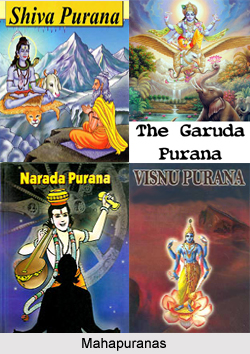 Purana is the name of an ancient Indian genre of Hindu and Jain literature. They are concerned with the common themes such as history, religion and tradition. Puranas are classified into two types. These are Mahapuranas and Upa Puranas. Mahapuranas are deemed to be the upper corpus of Puranas.
Purana is the name of an ancient Indian genre of Hindu and Jain literature. They are concerned with the common themes such as history, religion and tradition. Puranas are classified into two types. These are Mahapuranas and Upa Puranas. Mahapuranas are deemed to be the upper corpus of Puranas.
Traditionally there are 18 Maha-puranas. Each Maha-purana lists eighteen canonical puranas, but the contents of each list vary reflecting differences in time and place. These eighteen maha-puranas are divided into three groups and each group has six texts.
The Mahapuranas is a description of the Hindu trinity lords namely, Brahma, Vishnu and Shiva. Since all three are important gods, all these are given due emphasis in any Purana. But the relative emphasis often varies from Purana to Purana.
Classification of Maha-puranas:
•Texts that talk a lot about the incarnations of Vishnu are regarded as Vishnu Puranas, and are called Sattvika Puranas. It includes texts like Vishnu puranas or Bhagvatam puranas.
•Texts that emphasize creation more are regarded as Brahma Puranas and are called Rajasika Puranas. The instances of such puranas are the Brahmanda puranas.
•Texts that give a lot of importance to norms and rituals are regarded as Shiva Puranas, and are called tamasika Puranas. The Matsya purana and Agni purana are two instances of Shiva puranas.
Vaishnava classification by guna
Of the Mahapuranas it is said that six belong to the quality (guna) of goodness, six to passion, and six to ignorance. According to the Padma Purana, these are the Mahapuranas and their corresponding qualities:
•Sattva ("truth; purity"): Vishnu Purana, Bhagavata Purana, Naradeya Purana, Garuda Purana, Padma Purana, Varaha Purana
•Rajas ("dimness; passion"): Brahmanda Purana, Brahma Vaivarta Purana, Markandeya Purana, Bhavishya Purana, Vamana Purana, Brahma Purana
•Tamas ("darkness; ignorance"): Matsya Purana, Kurma purana, Linga Purana, Shiva Purana, Skanda Purana, Agni Purana
The author of Mahapuranas
Myths state that the Puranas were composed by sage vyasa- the narrator of Mahabharat. The texts, the scholars say, were probably written all over India and are being rewritten and reedited to the present day all over the world.
The term purana, which means "belonging to ancient times" or "an ancient tale or legend," appears in the Vedas. The specific corpus of the Mahapuranas, as opposed to generic purana "ancient tale", are generally estimated to date to the Early Middle Ages, or to roughly between the 5th and 10th centuries, but may contain older material.
Puranic genealogies
The Puranas also lay emphasis on keeping a record of genealogies. Vayu Purana once stated that, "As seen by good people in the ancient times the suta`s duty was to preserve the genealogies of gods and glorious kings and the traditions of great men". The Puranic genealogies add up to fantastic time depths. The Vedic and Puranic genealogies indicate a greater antiquity of the Vedic culture.



















